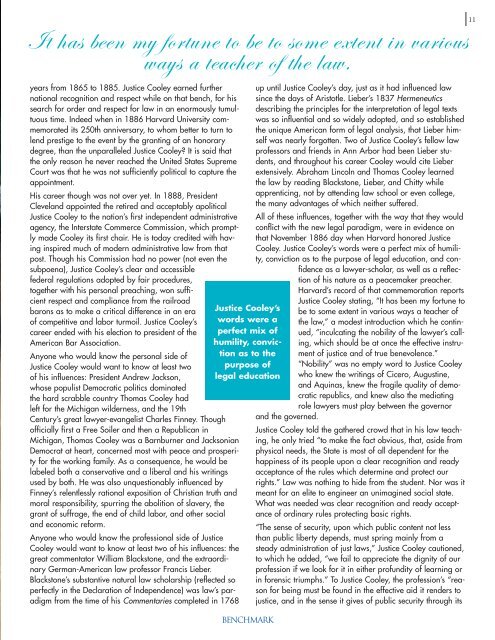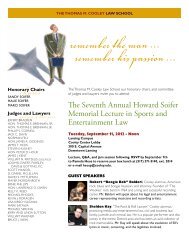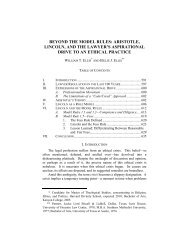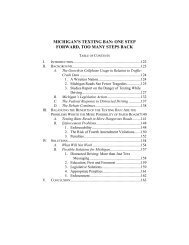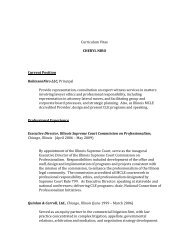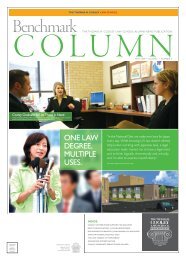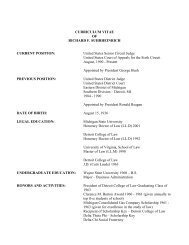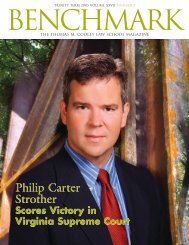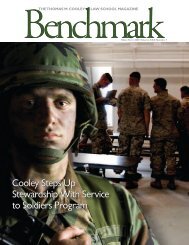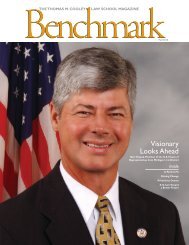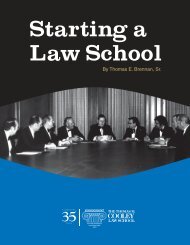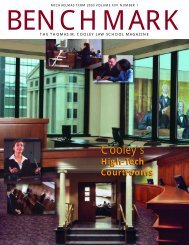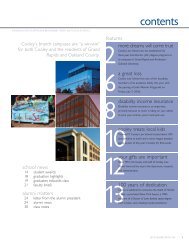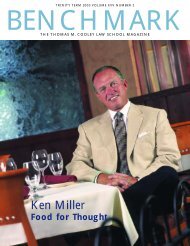Dennis E. Benner, Giving Back - Thomas M. Cooley Law School
Dennis E. Benner, Giving Back - Thomas M. Cooley Law School
Dennis E. Benner, Giving Back - Thomas M. Cooley Law School
You also want an ePaper? Increase the reach of your titles
YUMPU automatically turns print PDFs into web optimized ePapers that Google loves.
It has been my fortune to be to some extent in variousways a teacher of the law.years from 1865 to 1885. Justice <strong>Cooley</strong> earned furthernational recognition and respect while on that bench, for hissearch for order and respect for law in an enormously tumultuoustime. Indeed when in 1886 Harvard University commemoratedits 250th anniversary, to whom better to turn tolend prestige to the event by the granting of an honorarydegree, than the unparalleled Justice <strong>Cooley</strong>? It is said thatthe only reason he never reached the United States SupremeCourt was that he was not sufficiently political to capture theappointment.His career though was not over yet. In 1888, PresidentCleveland appointed the retired and acceptably apoliticalJustice <strong>Cooley</strong> to the nation’s first independent administrativeagency, the Interstate Commerce Commission, which promptlymade <strong>Cooley</strong> its first chair. He is today credited with havinginspired much of modern administrative law from thatpost. Though his Commission had no power (not even thesubpoena), Justice <strong>Cooley</strong>’s clear and accessiblefederal regulations adopted by fair procedures,together with his personal preaching, won sufficientrespect and compliance from the railroadbarons as to make a critical difference in an eraof competitive and labor turmoil. Justice <strong>Cooley</strong>’scareer ended with his election to president of theAmerican Bar Association.Anyone who would know the personal side ofJustice <strong>Cooley</strong> would want to know at least twoof his influences: President Andrew Jackson,whose populist Democratic politics dominatedthe hard scrabble country <strong>Thomas</strong> <strong>Cooley</strong> hadleft for the Michigan wilderness, and the 19thCentury’s great lawyer-evangelist Charles Finney. Thoughofficially first a Free Soiler and then a Republican inMichigan, <strong>Thomas</strong> <strong>Cooley</strong> was a Barnburner and JacksonianDemocrat at heart, concerned most with peace and prosperityfor the working family. As a consequence, he would belabeled both a conservative and a liberal and his writingsused by both. He was also unquestionably influenced byFinney’s relentlessly rational exposition of Christian truth andmoral responsibility, spurring the abolition of slavery, thegrant of suffrage, the end of child labor, and other socialand economic reform.Anyone who would know the professional side of Justice<strong>Cooley</strong> would want to know at least two of his influences: thegreat commentator William Blackstone, and the extraordinaryGerman-American law professor Francis Lieber.Blackstone’s substantive natural law scholarship (reflected soperfectly in the Declaration of Independence) was law’s paradigmfrom the time of his Commentaries completed in 1768Justice <strong>Cooley</strong>’swords were aperfect mix ofhumility, convictionas to thepurpose oflegal educationBENCHMARKup until Justice <strong>Cooley</strong>’s day, just as it had influenced lawsince the days of Aristotle. Lieber’s 1837 Hermeneuticsdescribing the principles for the interpretation of legal textswas so influential and so widely adopted, and so establishedthe unique American form of legal analysis, that Lieber himselfwas nearly forgotten. Two of Justice <strong>Cooley</strong>’s fellow lawprofessors and friends in Ann Arbor had been Lieber students,and throughout his career <strong>Cooley</strong> would cite Lieberextensively. Abraham Lincoln and <strong>Thomas</strong> <strong>Cooley</strong> learnedthe law by reading Blackstone, Lieber, and Chitty whileapprenticing, not by attending law school or even college,the many advantages of which neither suffered.All of these influences, together with the way that they wouldconflict with the new legal paradigm, were in evidence onthat November 1886 day when Harvard honored Justice<strong>Cooley</strong>. Justice <strong>Cooley</strong>’s words were a perfect mix of humility,conviction as to the purpose of legal education, and confidenceas a lawyer-scholar, as well as a reflectionof his nature as a peacemaker preacher.Harvard’s record of that commemoration reportsJustice <strong>Cooley</strong> stating, “It has been my fortune tobe to some extent in various ways a teacher ofthe law,” a modest introduction which he continued,“inculcating the nobility of the lawyer’s calling,which should be at once the effective instrumentof justice and of true benevolence.”“Nobility” was no empty word to Justice <strong>Cooley</strong>who knew the writings of Cicero, Augustine,and Aquinas, knew the fragile quality of democraticrepublics, and knew also the mediatingrole lawyers must play between the governorand the governed.Justice <strong>Cooley</strong> told the gathered crowd that in his law teaching,he only tried “to make the fact obvious, that, aside fromphysical needs, the State is most of all dependent for thehappiness of its people upon a clear recognition and readyacceptance of the rules which determine and protect ourrights.” <strong>Law</strong> was nothing to hide from the student. Nor was itmeant for an elite to engineer an unimagined social state.What was needed was clear recognition and ready acceptanceof ordinary rules protecting basic rights.“The sense of security, upon which public content not lessthan public liberty depends, must spring mainly from asteady administration of just laws,” Justice <strong>Cooley</strong> cautioned,to which he added, “we fail to appreciate the dignity of ourprofession if we look for it in either profundity of learning orin forensic triumphs.” To Justice <strong>Cooley</strong>, the profession’s “reasonfor being must be found in the effective aid it renders tojustice, and in the sense it gives of public security through its11


